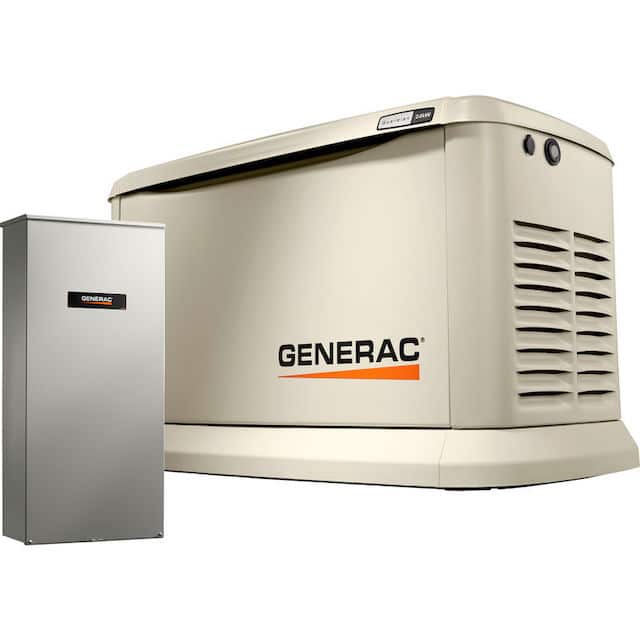
What Are The Benefits of a Whole-Home Generator?
When a power outage strikes, having a reliable backup generator can make all the difference. Whether it's due to a storm, equipment failure, or grid issues, losing power can disrupt daily life. But with various options available, how do you choose the right one? In this guide, we’ll compare portable and whole-home generators, explore fuel choices, discuss the pros and cons of each, and break down pricing to help you make an informed decision.
Portable vs. Standby Generators
What Are The Advantages of Portable Generators?
Portable generators are a budget-friendly option for providing power to essential appliances and lighting during short-term outages. These units are versatile and can be used for outdoor events, camping trips, or job sites. However, they are not designed for high-demand appliances or prolonged use.
Key Features:
- Runs on gasoline, propane, or diesel
- Must be manually started
- Requires regular refueling
- Suitable for temporary use and smaller power needs
- Can be stored when not in use
- Usually comes with built-in outlets for plugging in appliances directly
Pros:
- Affordable upfront cost
- Portable and easy to move
- Can be used for multiple purposes
Cons:
- Requires frequent refueling
- Must be manually operated
- Can be noisy and emit fumes
What Are the Benefits of Whole-Home Generators?
Whole-home generators are permanently installed and automatically start during a power outage. They connect to your home’s electrical system and a fuel source, ensuring seamless backup power. These generators offer peace of mind by providing continuous electricity without requiring manual intervention.
Ideal for:
- Homeowners who experience frequent power outages
- Individuals with medical equipment that requires constant power
- Those who work from home and need reliable electricity
- Homeowners who want to power part or all of their home during an outage
Key Benefits:
- Runs on a continuous fuel supply
- Automatically activates when the power goes out
- Can power an entire home
- Adds value to a home and provides long-term reliability
Home-n-Around Electric is an authorized Generac Dealer, offering professional installation and maintenance services to ensure your emergency generator is always in top condition.
Generator Fuel Options
Your generator’s fuel choice depends on the type you choose. Understanding the advantages and limitations of each fuel type can help you make the best decision.
Portable Generators: Operate on gasoline, propane, or diesel, requiring manual refueling. Gasoline is widely available but can be difficult to store safely. Propane burns cleaner and stores better, while diesel is more fuel-efficient but often used for larger units.
Emergency Generators: Typically use natural gas but can also run on propane if gas lines are unavailable. Diesel whole-home generators are more common in commercial and industrial settings than in residential areas. Natural gas is convenient as it provides an uninterrupted fuel supply without the need for refueling.
Choosing the Right Fuel:
- Gasoline: Easily accessible but has a shorter shelf life
- Propane: Cleaner-burning and longer shelf life, but requires a storage tank
- Diesel: More efficient and longer-lasting but often noisier
- Natural Gas: Reliable and low-maintenance, but requires a gas line connection
Average Generator Pricing
Portable Generators:
- Prices range from under $500 to $3,500 depending on power capacity.
- Connecting a portable generator to your home’s electrical system costs $750 – $2,500 based on size and installation factors.
- Additional accessories, such as transfer switches and extension cords, may add to the cost.
Emergency Generators:
- Prices start under $10,000, including the whole-home generator, installation, and fuel line connections.
- Costs vary based on generator size, fuel source, yard grading, and electrical setup.
- Higher-end models can power entire homes with high energy demands.
- Maintenance costs should also be factored in, as whole-home generators require regular servicing.
Which Generator is Right for You?
If you need occasional backup power for essential appliances, a portable generator may be the right fit. However, if you want long-term, automatic backup power for your entire home, a whole-home generator is the best choice.
Before making a decision, consider:
- How often do you experience power outages?
- What appliances or systems need power during an outage?
- Do you need a generator for home use only, or do you have additional needs like outdoor activities?
- What is your budget for the initial purchase and ongoing maintenance?
Need Expert Advice?
Home-n-Around Electric specializes in standby generator installation and is an authorized Generac Dealer. Our team can help you select the best generator for your home and ensure proper installation. Contact us today at 770-268-2134
or use our online form, to find the perfect backup power solution for your home!
Whole-Home Generator FAQs
A whole-home generator typically takes about 10-30 seconds to start once a power outage occurs. This automatic transfer ensures minimal disruption to your home’s power supply.
Regular maintenance should be performed at least once a year. However, if your generator runs frequently, servicing it every six months is recommended to keep it in top condition.
While portable generators are easy to set up, whole-home generators require professional installation to connect them safely to your electrical system and fuel source.
This depends on the fuel type and capacity. Natural gas-powered generators can run indefinitely as long as there is a steady fuel supply. Propane and diesel models are limited by the available fuel in their tanks.
If you experience frequent outages or rely on power for medical equipment, work, or home security, a whole-home generator can provide invaluable peace of mind and long-term reliability.




